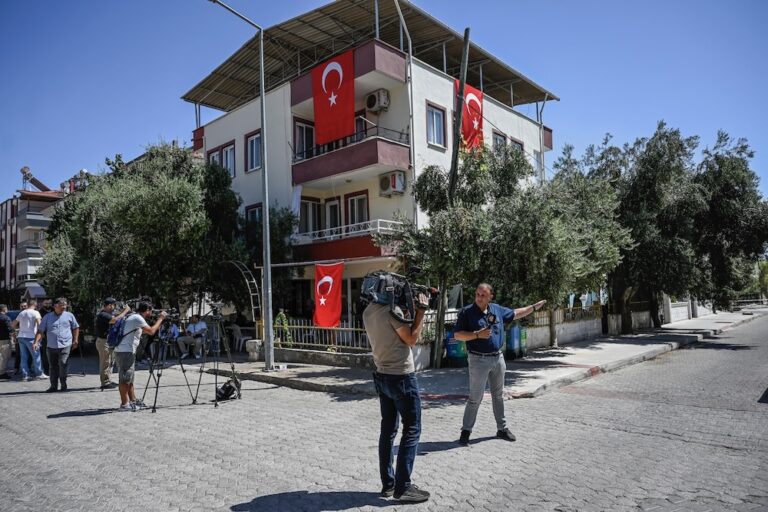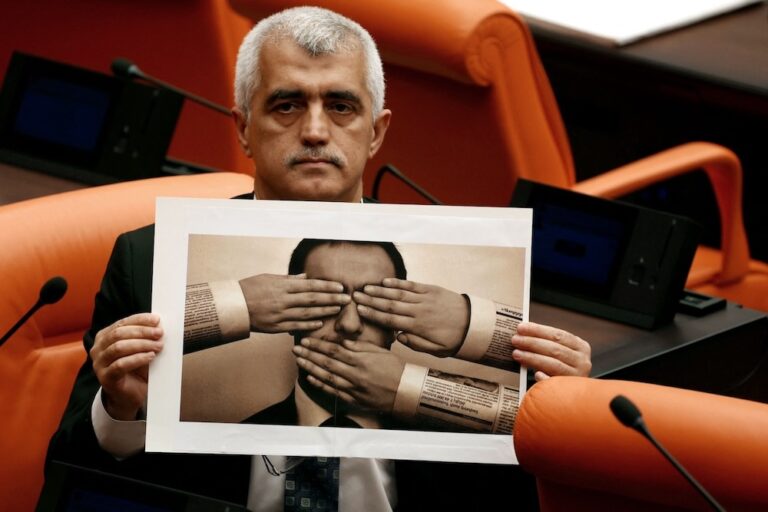(WiPC/IFEX) – On 11 October 2007, the Sisli Criminal Court in Istanbul sentenced Arat Dink, the editor of the Armenian Turkish magazine, “Agos”, and the magazine’s licence owner, Sarkis Serkopyan, to one-year suspended prison terms. They were convicted under the notorious Article 301 of the Turkish Penal Code on charges of “insult to Turkishness”. International […]
(WiPC/IFEX) – On 11 October 2007, the Sisli Criminal Court in Istanbul sentenced Arat Dink, the editor of the Armenian Turkish magazine, “Agos”, and the magazine’s licence owner, Sarkis Serkopyan, to one-year suspended prison terms. They were convicted under the notorious Article 301 of the Turkish Penal Code on charges of “insult to Turkishness”. International PEN protests the convictions, which are in direct denial of the right to freedom of expression as guaranteed under international legislation to which Turkey is a signatory. It is further alarmed at the continuing trials and sentences of other writers and journalists similarly charged under Article 301.
Dink and Serkopyan were sentenced for an article carried in “Agos” on 21 July 2006, which reported on an interview that then-editor of the magazine, Hrant Dink, had given to the news agency Reuters. In it, Hrant Dink is quoted as referring to the mass killings and disappearances of Armenians in Turkey in the early years of the twentieth century as a genocide. Hrant Dink was murdered by a nationalist extremist six months later, on 19 January 2007.
Hrant Dink’s murder led to mass demonstrations in Turkey and international condemnation. He had earlier been sentenced in 2005 to a six-month suspended prison term under Article 301 in another case. International PEN shares the belief that this led him to be identified as a “traitor” and thus a target for extremist nationalists. His killer, and a number of others accused of being accomplices, are currently on trial. Concerns remain high for the safety of Arat Dink, Serkopyan and others who are on trial under Article 301.
Even at the highest levels of Turkish government there is recognition that this law is problematic. A few days ago, newly-elected President Abdullah Gül suggested that it could be amended. International PEN is calling for the article’s repeal, and is thus hugely disappointed that around 20 writers and journalists are presently on trial under Article 301 and that convictions continue.
On 27 September, writer Umur Hoztali was convicted to a six month prison sentence, commuted to a fine of around 1,770 Euros. He had been charged for an article entitled “Irritating Men” which criticised the police and judiciary and suggested that they are distrusted by the general public.
In another high profile case, publisher Ragip Zarakolu was in court in early October at the twelfth hearing of a case against him opened in August 2005 for publishing “History Will Set us Free /Turkish-Armenian Conciliation” by an Armenian author, George Jejian. The hearing was again adjourned, to 5 December.
These developments indicate that there has been little change of attitude towards the application of Article 301 despite Hrant Dink’s murder.
In a related development, German PEN has announced that “Agos Magazine” will be awarded Hemann Kesten medal 2007 endowed since 2000 with 10,000 Euros by the Hessia Ministry of Sciences and Arts. The medal will be presented to Hrant Dink’s wife, Rakel Dink, at a ceremony to take place in Darmstadt, Germany, on 15 November, International PEN’s “Day of the Imprisoned Writer”. The guest speaker will be Daniel Cohn-Bendit, French-German publicist and politician (MEP).
RECOMMENDED ACTION:
Send appeals to authorities:
-protesting the one-year sentences served against Arat Dink and Sarkis Serkopyan and the continuing trials against other writers and journalists under Article 301 and other laws that suppress the right to freedom of expression
-pointing out that these trials are in contravention of international standards protecting the right to freedom of expression as enshrined under Article 19 of the International Convention on Civil and Political Rights, and Article 10 of the European Covenant on Human Rights, to which Turkey is a signatory
-expressing the hope that these trials will be dropped in recognition that they are in breach of the international treaties to which Turkey is committed
-supporting calls for the repeal of Article 301, in recognition of the fact that it has been used to bring numerous people to the courts solely for having legitimately expressed their opinions, in direct violation of international human rights standards.
APPEALS TO:
Prime Minister Recep Tayyip Erdogan
Office of the Prime Minister
Basbakanlik
06573 Ankara, Turkey
Fax: +90 312 417 0476
Minister for Foreign Affairs
Mr Ali Babacan
Office of the Prime Minister
Basbakanlik
06573 Ankara, Turkey
Fax: +90 312 287 8811
Please contact the International PEN office if sending appeals after 15 November 2007. Please copy appeals to the source if possible.


